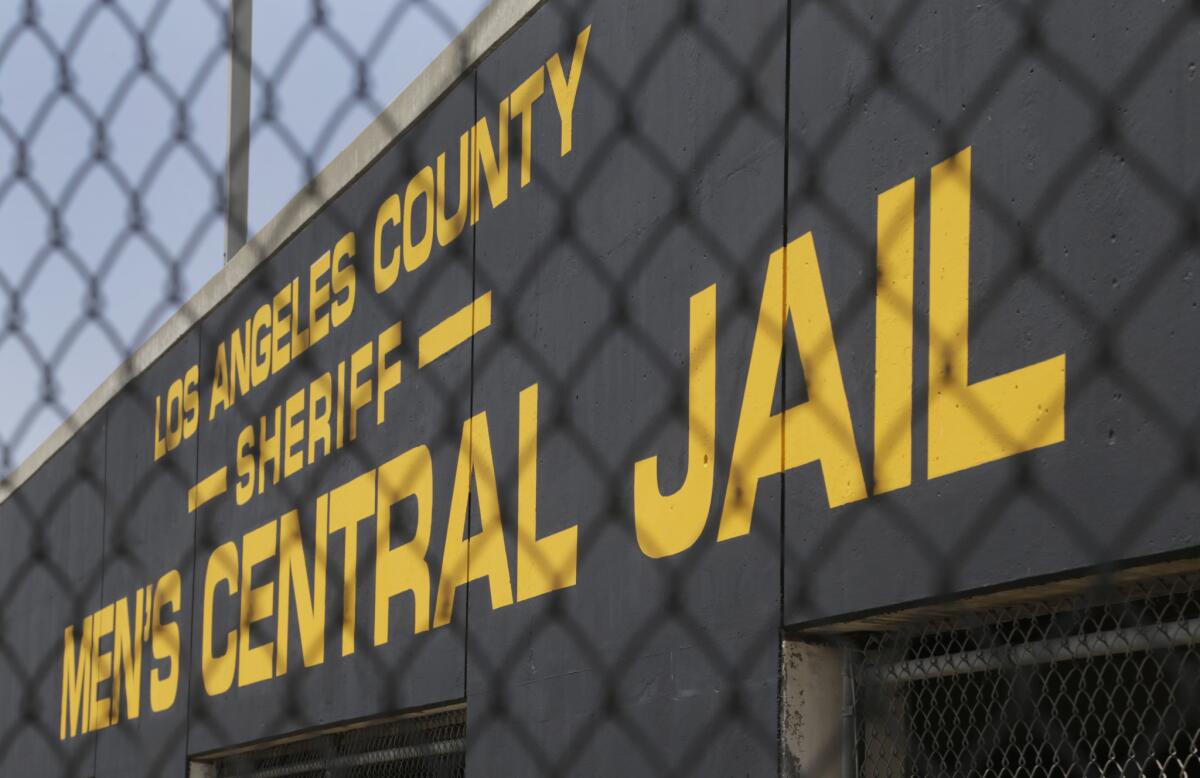Muslim men sue L.A. Sheriff’s Department, alleging religious discrimination in jail

- Share via
Three Muslim men are suing the Los Angeles County Sheriff’s Department, alleging they were denied access to an observant diet and proper religious garments and texts, while the same accommodations were made for inmates of other faiths.
The lawsuit, filed Monday by the Council on American-Islamic Relations, argues that the Sheriff’s Department has engaged in a “systematic effort to disfavor Muslim inmates and their spiritual needs over those of inmates of other faiths.”
The three men claim staff inside the Men’s Central Jail either delayed, or in some cases outright denied, their access to foods consistent with a halal diet, copies of the Quran or time for weekly prayer, according to the lawsuit. The men also contend deputies heavily scrutinized their knowledge of the Islamic faith before deciding whether or not they should have access to a halal diet.
A spokesman for the county referred questions to the Sheriff’s Department, which did not respond to a request for comment.
“The Los Angeles County Sheriff’s Department treatment of religious requests from inmates is egregious,” CAIR’s National Litigation Director, Lena Masri, said in a statement. “Our clients have had to resort to hunger strikes to get basic religious accommodations to practice their faith after their written requests and grievances were repeatedly ignored and denied.”
Joe Alfred Taylor III first requested that he be provided halal foods in February 2017, but a deputy told Taylor he was “not a Muslim,” according to the lawsuit. Taylor was quizzed about his knowledge of Islam several times, engaged in a days-long hunger strike and had access to halal foods approved and then revoked with little explanation between February 2017 and late 2018, the lawsuit contends.
Two other inmates, Miguel Arciniega and Hugo Cortez, claim they endured similar treatment. In the lawsuit, Cortez said that when he answered questions about his faith with the “proper Arabic terminology,” a Sheriff’s Department sergeant told him “we’re in America and we don’t speak Arabic here.”
The lawsuit also contends that while Muslims inside Men’s Central Jail are denied appropriate prayer times, access to religious attire and celebrations of certain religious feasts or days of observance, similar accommodations are made for inmates of Christian, Jewish or Buddhist faith. The men claimed Passover and Christmas celebrations were permitted inside the jail last year, but no such allowances were made for Eid, which marks the end of Ramadan, according to the lawsuit.
All three men remain in custody, said Carolyn Homer, a trial attorney for CAIR. Court records show Arciniega was charged with murder in connection with a 2015 homicide and is awaiting trial. He was also charged with attempted murder in connection with jailhouse assaults allegedly carried out at the direction of the Mexican Mafia, according to the Los Angeles County district attorney’s office.
Cortez is awaiting trial on murder charges related to a 2011 slaying, jail and court records show. Taylor III was convicted at a recent trial, but Homer did not know what charges he had faced.
The federal Religious Land Use and Institutionalized Persons Act protects the rights of prisoners to observe their chosen faith and grants them access to certain types of garments or diets, unless the need would compromise security. But police agencies in Southern California have repeatedly run afoul of the law.
Last year, the Ventura County Sheriff’s Department had to pay out $75,000 to settle a lawsuit after a Muslim woman claimed deputies forced her to remove her headscarf while in custody. In 2017, the city of Long Beach had to pay $85,000 to a Muslim woman who was forced to remove her headscarf by officers arresting her on a shoplifting warrant.
Some of the state’s largest law enforcement agencies say they take steps to prevent fraudulent claims of religious affiliation made for the sake of receiving certain benefits, such as access to different food. Last year, the Los Angeles Police Department told The Times they have chaplains on call to address such situations.
But Homer said questioning an inmate’s faith is a clear constitutional violation, and contended the Sheriff’s Department’s alleged tactic of grilling her clients about “minutiae” of the Islamic faith was a naked attempt to bar them from access to halal meals.
More to Read
Sign up for Essential California
The most important California stories and recommendations in your inbox every morning.
You may occasionally receive promotional content from the Los Angeles Times.











